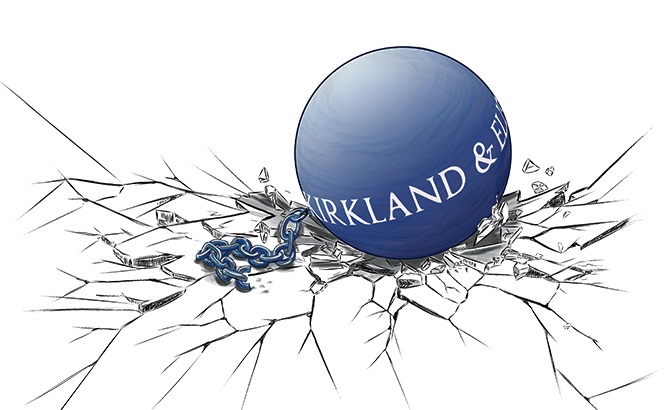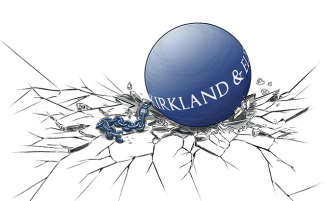For journalists, ill winds usually bring a few benefits, not least that readers have greater interest in what we’re churning out. But while it’s a good time for industry anoraks to get the attention they crave, it’s not the pieces I’ve done in 2020 on crisis, coronavirus or even Black Lives Matter that have attracted the biggest audience. The most read was an article from March focused on the two-horse race between the world’s largest law firms, Kirkland & Ellis and Latham & Watkins, and its wider relevance for the high-end legal market.
That speaks to the extraordinary interest among peers in Kirkland, which has defied expectations to batter its way to the top of the global market in the last decade, much to the startled unease of traditional elites in New York and London.
That the Chicago-bred juggernaut has secured such a hold on the profession’s collective imagination speaks in part to Kirkland’s disregard for many of the received wisdoms of global law. While other firms pepper their rhetoric with ‘collaboration’ and ‘innovation’, Kirkland fashioned its own singularly-entrepreneurial path with a dash not seen since the respective glory days of Skadden Arps and Clifford Chance.
Consider the magnitude of that rise. In 2008, Kirkland posted revenues of $1.28bn, by 2020 it had surged to $4.15bn, while also boasting profit per equity partner (PEP) of $5.2m and City revenues exceeding $400m.
Even now, with conversations with law firm leaders dominated by Covid-19, global recession and what to do with 300,000 square feet of prime London real estate, talk still quickly moves to: ‘So, how’s Kirkland doing?’
The underlying question is obvious: will this crisis end Kirkland’s extraordinary momentum and expose the weaknesses its critics have long argued will haunt it, or merely serve to strengthen an already commanding hand?
The point is fundamental for Kirkland because major law firms that achieve prolonged outlier growth often build up structural weaknesses masked by relentless expansion. Robbed of growth by a market shock, as seen with DLA Piper and much of the Magic Circle after the banking crisis, such firms can abruptly lose that self-sustaining cycle as problems set in and rob the institution of its swagger.
In a few cases such shocks have seen apparently successful operations badly falter, most notably in the UK with the collapse of Halliwells a decade ago, though such extreme outcomes usually come with firms previously dogged by middling or erratic performance.
Will Kirkland fall into either camp?
There is no doubt that the firm built in its modern incarnation by pugnacious chair Jeffrey Hammes currently faces the first serious test of its foundations and Kirkland has some particular challenges. For one, it has a huge transactional team – with roughly 1,000 lawyers, by far its largest practice – now facing a deal market set for deep freeze through 2020.
Kirkland also has a partnership heavy with youth, thanks to its famed system of accelerated promotions, and many senior lawyers shipped in from rivals, thanks to a decade of aggressive recruitment. It simply cannot call on the cultural bonds or numbing grip of institutional inertia in the manner that most firms generating $2m-plus PEP do when turbulence hits. Moreover, partners that have become used to super-growth will find the hard grind of global recession a rude awakening. Kirkland, which has more than its share of divas, will certainly have to manage its 1,000-plus partner ranks deftly to ensure the jostling energy and animal spirits remain constructively channelled.
But allowing for these genuine challenges, a closer look at its business model strongly suggests that Kirkland should emerge even stronger from the current crisis.
For one its practice remains, for a firm of its size, extraordinarily focused, zeroing in on just four areas: transactions; litigation; restructuring; and intellectual property. Even within its largest practice, transactions, Kirkland tacks heavily towards major sponsors on banking and corporate work, rather than generalist corporate mandates, avoiding the trudge of plc panels.
The firm also has a small network for its size, with just 16 offices, including only six outside its US heartlands. Moreover, much of its revenue growth has come through driving extraordinary productivity, around $1.6m revenue per lawyer for its last year, rather than adding significant head count. Kirkland faces the current crisis in lean shape, with around 2,500 lawyers, one of the lowest tallies in the global top ten.
This unalloyed focus will stand it in good stead, making it easier to stand out against generalist rivals and tightly direct its competitive energy. While keeping its huge transactions team busy is no given, its private equity base looks like the first movers to wade back into the deal market. Kirkland is also positioned as go-to firm with a string of its marquee sponsor clients, meaning it will benefit even as conflict counsel twiddle their thumbs amid reduced deal flow.
It barely needs noting that its muscular and famously productive litigation and restructuring practices provide Kirkland with a welcome hedge when crisis hits, with restructuring in particular looking on superb form in recent years.
Leaving the practice mix aside, perhaps Kirkland’s biggest asset will be the very culture that critics decry as the time bomb beneath it. For one, the firm’s lean and fast-moving leadership, lack of red tape and emphasis on entrepreneurial drive is a mix that looks well-suited for a brutally tough 2020 and 2021. As much as rivals like to talk down Kirkland partners as money-driven mercenaries, its ranks have plenty of true believers that have bought into its ethos and can-do spirit. It looks a much better formula for current conditions than the bureaucracy and dysfunctional decision-making that too many global law firms indulge in.
If there is one point that will test the health of Kirkland’s soul amid the current crisis, it will be its attitude to retrenchment and job losses. Some will argue for substantial cuts – this should be resisted. Such tactics will do more damage to Kirkland than most peers, undercutting its model and playing into an image the firm has been trying to ditch for years. Latham can get away with some axe-wielding, Kirkland not so much.
The firm will also need a strong stomach to keep investing through the hard times, though its recruitment in May of Wachtell Lipton corporate partner Ed Lee suggests Kirkland is still ready to place long-term bets on outstanding talent, whatever the immediate market conditions.
What is emerging is a difficult balancing act, one that will need a more deft touch than we’ve previously seen from an outfit renowned for bling, flair and audacity. Striking that balance will certainly test whether new chair Jon Ballis can live up to his billing as a more measured and subtle leader than Hammes, as befitting Kirkland’s new status as industry leader rather than challenger brand. Known for disruption and tearing down – the title of Legal Business’s last in-depth profile of the firm was ‘Wrecking ball’ – Kirkland must become as adept at building or at least preserving if it wants to live up to its potential.
With a good crisis, Kirkland’s position and considerable influence on the legal market will be strengthened hugely. If it falters, Covid-19 will have been the immovable object that stopped this irresistible force. I’d bet on the former outcome but by summer 2021 we’ll pretty much know which way it’s going.
For an in-depth look at Kirkland’s rise see our 2018 cover feature













